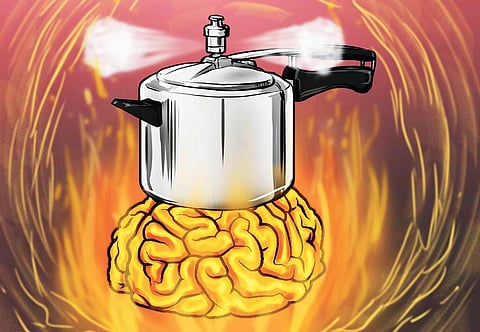

If you’re plugged in to what’s going on in our country, it is obvious that there’s only one question the answer to which the nation wants to know. Yes, of course it is the viral Hindi TV series earworm video: Rasode mein kaun tha?
Endless memes have asked this vital question so far: Who was in the kitchen? Who took out the chickpeas from the steam cooker and placed the cooker back on heat? Some of my friends have been tempted to experiment: What happens when you put an empty steam cooker on high heat? (Word from the wise: Do NOT try this at home. It could be a fire hazard, and lead to injuries.)
All humorous misogynistic takes aside (it will take decades for Hindi soaps to place a man amid kitchen accidents as normally as they do a woman), it is fascinating to watch the video of ‘Kokilaben’, a stereotypical Indian mother-in-law character gone viral—so viral that food delivery apps have been cashing in on the trend to market themselves.
The empty cooker in question is a uniquely Indian device. It is the one touted to show the love of all husbands towards their wives. Kitchen mishaps with this ‘pressure-cooker’ device are not entirely unheard of—it whistles menacingly to release steam built inside, and I’ve myself seen the mayhem a faulty safety-valve can wreak. In very early Bollywood films, directors used kettles of milk or tea boiling over to show frustration or anger in a character, but with the rise of pressure cookers in the 60s, the boiling temper of a heroine or mother began to be shown through the metaphor of the whistling pressure cooker.
A humorous video meme is a simple thing, but like all jokes that work, it asks the most important questions. Who was in the kitchen? Who caused the disaster? Cooking with a pressure cooker can be tricky if you’re not paying attention. Too much water and your kitchen will be sprayed with the liquid inside, too little and you’ll burn your food; with an empty cooker or a wrongly-attached gasket or a faulty safety-valve, you have a disaster on your hands, and not just the Hindi soap variety.
India right now is that pressure-filled cooker, and much as we would like to push it under the carpet, the question remains—who was in the kitchen? Who is responsible? Depending on who you ask, the answer would be Nehru (the man and his strategies were not without flaws—and no objective observer can deny the decades of nepotism and corruption that followed); the Mughals (amorphous historical figures are the most suitable candidates when you’re looking for someone to blame for a disaster); or the Chinese (let’s face it, they’re bullies, flexing muscles all over the world; were the origin country of the pandemic, and as a nation we’re incensed enough to shun Indians from the Northeast; and even Tibetans, who have suffered the most at the hands of the Chinese).
Ask others, and fingers would be pointed at the current administration at the Centre, or the various state governments, some of them at odds with each other. That’s the great part about analysing a disaster. The finger-pointing. The finger is always pointed at someone else. No one says, “I’m responsible.” Kokilaben says the words “Main thi”—I was there—but they are posed as a rhetorical question, “Main thi?” because she begins by saying she herself was definitely not there, because she had gone to take a bath. So, India, who put the chana in the pressure cooker?
Who took it out and placed the cooker back on the heat? Who went to take a bath? Main thi? Tum thi, kaun tha? Who’s the Raashiben here? We can’t ask these questions out loud because the cooker has burst right now, and instead of multiple Hindi TV soap reaction-shots, we have a staggering economy and starving millions. Our attention is reserved for crucial issues that are either 500 years old, or involve the investigation of a movie star’s tragic demise. As in all such situations, for a populace with no alternative options and no intent of self-introspection, the best answer lies in humour. Kokilaben has gone to take a bath, so when the cooker burst, rasode mein kaun tha?
By invitation
Damyanti Biswas
Author and activist Twitter: @damyantig